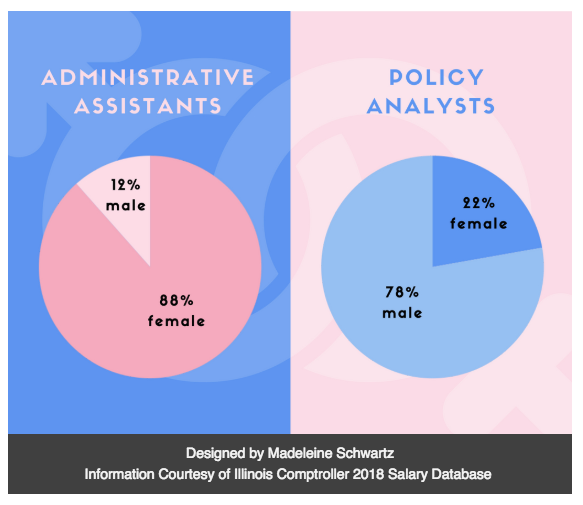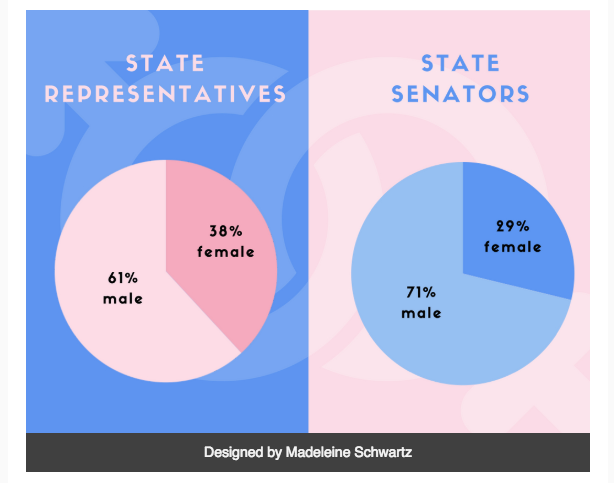The #MeToo Movement Should Look Beyond Lawmakers to Change Springfield’s Culture

As sexual harassment allegations continue to plague Illinois’ political establishment, a review of staff hiring practices raises questions about the depth of gender inequality in the General Assembly.
Just 22 percent of staff-level research and policy analyst positions in the General Assembly are filled by women while 88 percent of administrative assistant positions are filled by women, according to an ICPR analysis of the Illinois Comptroller’s 2018 salary database. The results suggest women are more often employed in positions that remain comparatively less involved in crafting policy proposals.

Women make up half the state’s population, but only 38 percent of the Illinois House of Representatives and 29 percent of the Illinois Senate. Moreover, all four legislative leaders — House Speaker Michael Madigan, Senate President John Cullerton, and minority leaders Jim Durkin and Bill Brady — are men.
Illinois, though, does have one of the highest ratios of female lawmakers in its state legislature at 36 percent. The state with the highest percentage of female lawmakers is Arizona at 40 percent, according to the National Council of State Legislatures.

The latest sexual harassment allegations to hit Springfield came last week when first-term state Rep. Nick Sauer resigned after his ex-girlfriend accused the Libertyville Republican of creating an Instagram account and populating it with nude photos of her. Chicago police and Lake County prosecutors are investigating the allegations.
The #MeToo movement significantly impacted Springfield in late 2017 after a lobbyist accused powerful state Sen. Ira Silverstein of sexual harassment. In 2018, two top-level aides to House Speaker Michael Madigan were ousted due to sexual harassment allegations by their staff, and House Deputy Majority Leader Lou Lang stepped down from his leadership position after being accused of blackmail, sexual harassment, and verbal abuse by medical marijuana advocate. Lawmakers have since appointed a legislative inspector general, a position that had been left vacant for two years, and passed laws aimed at fixing flaws in the state’s ethics and complaint reporting process.
Despite these efforts, the reputation of Springfield as a “boys club” is only likely to persist unless women are in positions to craft lasting reforms and impact the state Capitol’s culture.
Illinois legislators, though, aren’t in control of hiring their Springfield staff. In the House, analysts are hired by the research and appropriations director and the party leader’s chief of staff. Meanwhile, administrative assistants who work for lawmakers are hired by the House Clerk’s Office and the party leader’s chief of staff. In the Senate, analysts and administrative assistants are hired by the Secretary of Senate’s Office and the respective party leaders.
Pennsylvania has similar staff hiring procedures. Pennsylvania legislators hire their own staff in their district office but their staff is appointed in their state Capitol office by their respective party caucuses. State legislators in other states, such as Florida, have full control over hiring their staff.
Elected officials are chosen by the voters, but once in office, it’s incumbent upon them to create a working environment equally representative of their constituencies. While Illinois lawmakers’ staff are largely appointed, they’re in a position to request to have more input on the hiring practices. When a government, company, or organization has an employment structure based on gender stereotypes, it reinforces those stereotypes and acts as a barrier to change. To effectively combat sexual harassment and gender inequality, the General Assembly should pay close attention to its own hiring practices and include input from the elected legislators.
ICPR has been at the forefront of advocating for reforms to combat sexual harassment in the state Capitol. It shared its Best Practices proposal with the General Assembly in November 2017 and will participate in the Senate Sexual Harassment Task Force Hearing in Chicago on Aug. 21.
Back
